Introduction
Have you ever wondered if essential oils could help treat:
😔 SIBO or IBS
😢 Leaky gut
😩 Skin issues or irritations
😴 Fatigue and brain fog
😯 An autoimmune condition
If so, this week's Goodness Lover podcast episode is for you! We are thrilled to give you the inside scoop on essential oils and their potent medicinal effects on the body! 🦠
This week, we sat down with Dr. Eric Zielinski — author of “The Healing Power of Essential Oils” and “The Essential Oils Apothecary” — to talk about the impact of essential oils on gut health conditions and so much more!
Watch the Interview:
Dr. Zielinski explained:
🌱 The fascinating adaptogenic ability of essential oils to provide the body with what it needs to heal
🚽 How digestive function can be greatly impacted with essential oil blends
🧫 How essential oils can be dangerous if not used correctly
👨⚕️ The research behind the healing power of natural surroundings and aromatherapy and in surgical post-operative patients
🤕 How to practically reduce toxicity in your home
🦠 Mini synergy blend recipes for antibacterial growth and SIBO, IBS and leaky gut
🧘♂️ How Eric incorporates essential oils into his daily lifestyle
And much more that can help create a healthy life! 🎙
Additional Resources
To connect with Dr. Eric Zielinski and discover more of his work, you can find him on Instagram and Facebook. You can also visit his website here.Transcript
Sarah: Hello, and welcome back to the Goodness Lover Show. Today, we're joined by Dr. Eric Zielinski, who's a bestselling author and founder of the website, naturallivingfamily.com, which is viewed by millions of people every year. He's here today to talk to us all about essential oils and how they can actually be a powerful addition to your health regime. We'll learn about the history, usages and how essential oils might actually also help with gut health. Let's get into it.
Matt: Dr. Eric Zielinski, we are so excited to have you on the show today and to talk everything around essential oils. Dr. Eric Zielinski: Yeah. Thank you for having me. The best thing about these podcasts are the pre-interview chats. And is just really great to connect with y'all, and love what y'all are doing. You're impacting so many people and helping folks. And it's really an honor and a privilege to be on the show.
Matt: Awesome. Well, I think we've working together for a little while now and we've hung out a little bit. So yeah, we're super excited to finally join our tribes together and discuss everything around essential oils, which we know you've been championing for a very long time.
Matt: So, I was actually curious to dive into how did it all start for you? This thing, I think it was a few years ago, it became a bit of a crave. I'm assuming you were there before it was cool, I'm guessing.
Dr. Eric Zielinski: Yeah, actually, right at the height of it all. The Bible says something, a man, a woman, a person's mind plans their ways, but the Lord directs their steps. And there's something about that proverb. This was not part of my five or 10, or 15, 20 year vision plan. This was not on the vision board. It was something where I quit a perfectly good corporate job, working by the way for Dow Chemical, which is interesting. It's a whole irony of it all, to chase a dream, to open up a health center.
My wife and I wanted to have an abundant life, natural health wellness center, chiropractic and support for home birth, and support for homeschool, and just holistic ways. And I went through school. And this is really the cool thing is that as a college student, going back to get my doctorate degree, the wonderful thing was invention birth on a necessity. We really quickly became broke, financially. We were just pinching two pennies just to make the ends meet. Student loans weren't covering it. And one, two, three babies later, it was a financial struggle just to get by. And being in my thirties and having a family, I did whatever I could do to put food on the table.
And there was a scholarship opportunity at my school to write a case study. And it ended up being something I loved to do. I got the scholarship. I ended up getting published in a peer review journal. And it started what has now become a 10 year career in public health.
And so, at the time, again, being broke, absolutely broke, living on food stamps and barely getting by, I started writing. I started becoming essentially a ghost writer for hire. And one of my clients at the time in my senior year, last year commissioned me to write a series of public health reports on essential oils. That was my job to literally read hundreds of trials, to talk about the therapeutic efficacy of how essential oils could be used to balance blood pressure, blood sugar, how it could potentially even fight cancer, how it could even soothe or heal gut issues like SIBO or IBS, whatever it might be. And my mind was blown. I was like, "What in the world is this stuff?"
Now, part of that discussion is my wife has been using essential oil since she's been a teenager. She had a chemical burn on her face. And her mother's friend is in Ojibwa or a Cherokee practicing Ojibwa medicine. And nothing worked for my wife. She tried creams. And she tried over the counter stuff. And my wife mother's friend gave her first essential oil kit when she was 14. And that turned her onto lavender, which ended up helping heal her face.
And so, my wife always used essential oil since we got married. But to be quite transparent, I just marginalized them as smelly stuff. I'm like, "That's what my wife uses." Right? I'm not going to put on ylang ylang and go play beach volleyball with guy friends. They're going to take [inaudible] from me. Right? Seriously. So, I just like, "Okay, whatever."
And another part of it when I started to investigate them early on, I went to Dr. Google. By the way don't ever go to the Dr. Google. And I went to Dr. Google and I'm like, okay, essential oil for acne. Essential oil for a pimple. Because of significant gut problems as a child, I've always had horrible, horrible skin and cystic acne. That's a whole another story.
So, I developed a pimple several years ago and Dr. Google told me to get a drop of oregano and put it on my skin. Okay. Well, great. Because the carvacrol and oregano has been shown to kill the bacteria related acne. Well, the article didn't talk about diluting the essential oil. It just said, put straight oregano. Well, it burned my skin, like really bad. And I ended up getting like a quarter size mark around my skin that made more eruptions, caused more acne. I'm like, "Okay, this stuff is dangerous. This stuff is real. What am I getting myself into?"
And so, that really just propelled me to where I'm at today, because I started to realize, "I don't really have a medicine cabinet. I don't have something that has a natural ability to combat infection, to help with disease, to help with symptoms like I would with medicine." And no offense to supplements, no offense to food. But if you have a migraine, nothing you're going to eat is going to make that go away within 10 minutes, 20 minutes, 30 minutes. And so, I wanted a medicinal punch. I wanted something, where I didn't have to rely on medicine. And that's where essential oils came into my life.
And so, here we are later, wow, three bestselling books. We're currently writing or preparing our fourth one. And we somehow became like the go to about how to use essential oils online. And quite frankly, I think the reason why is because we don't sell them. And I won't even recommend the company that we use or company is because in American market, the Food and Drug Administration greatly restricts people from selling a product that they talk about health claims. So, for us, look, we're just going to talk about the health claims. We're going to talk about what the research shares and let you find a company that works for you. And we'll help you find one. But that's where I think we're very unique in that we're completely not branded and we're financially unbiased.
And so, next thing you know, like five million visitors on our website. And we just have this massive following of people that want to learn how to use these things safely and effective.
Matt: That's just such a cool story, how it started. So, I'd love to zoom into your brain, as you were starting to peel through this data. What were some of the big aha moments for you when you discovered, wow, these aren't just some smelly things. These can have a therapeutic impact on someone fighting a certain condition. Was there a certain breakthrough studies that you read or was there something that you really started getting a little fire to start this website?
Dr. Eric Zielinski: Yeah. A couple things. The history of aromatherapy really hit me. Don't believe what you've heard, y'all. Jesus didn't use frankincense oil. It didn't exist. Right? Well, how do I know? Well, steam installation wasn't invented until ninth century AD by Arab alchemist. There you go. Right? The myths out there, the healing oils of the Bible, like all that stuff, the myths out there in the blogosphere are rampant. That was number one.
Number two was like, I have to question almost everything about what taught, because a lot of folks are just, unfortunately, they haven't educated themselves, or they've been passed down information from different multilevel marketing companies, which by the way, I love network marketing. It's a great business model. Cool for you. But I'm not getting my health advice from a network marketer. They're not a physician, right? I'm a licensed primary care physician. And there's something to be said about balancing that with what the research shares and about how to use certain things like natural medicine.
So, the history was really important. It was really important to know that you just can't put a drop, I just can't put a drop of this in my mouth and expect there to be no adverse reactions. I mean, they're highly caustic. They could cause what's known as sensitization. They could cause what's basically allergic, like contact dermatitis. You can be allergic to these things. And I'm like, well, why? To answer your question, like why? Is because they're the basis for all medicine today. And that right there is, should be the truth bomb that stops everyone for just a second.
What are these things? Essential oils are volatile, organic compounds. A volatile, meaning they readily evaporate at ambient room temperature. That's why when you put your nose into a rose, you smell the beautiful aroma, because there's lit really particles, microscopic particles that are being omitted from the plant that tell your nose, "Hey, there's something here." And it smells wonderful, right? Volatile. Organic meaning carbon based. And compounds, meaning there are many different chemicals. So, when you're pulling up this bottle of lavender, you're looking at 150 to 200 different plant chemicals in there. So, you're also looking at three pounds of lavender flowers here. Chew on that for a second, three pounds of lavender flowers. How much does one leaf or one blossom weight? Like three pounds. It's unbelievable amount of concentrated plant matter.
So, why is this important? While when our ancestors, for example, used to use willow bark, which has been known for thousands of years for its analgesic pain relieving property. It's an anti-inflammatory. Our ancestors extracted that. And they used it as pulses and sabs, and they made ointments out of it.
Well, the wonderful thing about science is science determined what is it about willow that really helps kill pain and soothe. And it's a salicin. It's a chemical in the salicylate family, a methyl salicylate. So, well, what do they do? Really smart people took that, extracted it and manufactured it chemically, and put a white shiny coating on it and sold it as aspirin. It's literally the basis for aspirin. Wow.
So, what else does that tell us? It tells us that Dr. Susan Chemist, Dr. John Chemist, doesn't wake up in the middle of the night with a dream or a vision with chemical structures to create new drugs. These drugs are not made in vacuums. They're all based at one point or another in evolution from plant chemistry at its core, whether they extract laminin, whether they extract menthol. Well, you've heard of eucalyptus menthol, I'm sure. You've heard of like menthol bengay, or sprays, or anything, because menthol pain killing.
Well, what do you think menthol is? It's a primary component of peppermint. It's a primary component of spearmint. So, they take the menthol, they take the eugenol, they take the carvacrol, they take the pinene, these chemicals, and then they make drugs out of them. Wow. That is completely different than, "I just want to smell good." This goes way beyond, like using patchouli, because you're a hippie. Right? And that's the stigma in America. You're a hippie. You like patchouli. You like to use these smells. It makes you smell good. No, no, this is medicine. It's literally medicine at its core. And that's what threw me for a loop.
Because before the advent of the antibiotic, what do you think people used to use? What do you think the World War I and World War II combat medics used? Essential oils on the front lines. It was the only thing that could help combat infection, lemon grass, tea tree, eucalyptus, lavender, clove. And then since then, sadly, it's all come full circle. But in the mid forties, when the advent of the antibiotic came, people are like, "I don't want to use that stuff anymore." Which you can't blame them. Who wants to walk around smelling like pizza? Like oregano has a very potent smell. It's messy. And God forbid, you get some on your hands and you rub your eye, you got to burn your eyeball. This happens. This is like messy, apothecary stuff.
And believe it or not, most people are lazy. They want a pill. They want something quick and easy. They don't want to deal. I make my own capsules at home. I get my dropper, I get my capsule. I take it. Who's willing to do that? Very few people, sadly.
So, when the advent of the antibiotic came, it totally took away this need and this reliance on plant medicine. And next thing you know, here we are 50, 60, 70 years later and people are realizing, "What did we do?" We went completely reliant on plant medicine to completely reliant on pharmaceutical grain medicine, to now there's like, okay, there may be a balance of the two. And that's what I'm proposing, a balance of the two.
You need to do what you need to do to stay alive and be well. But to say it's all or nothing. And to say in the cancer world, that's why I love integrative cancer or integrative oncology, because when you talk to a patient, it shouldn't be, "You have to take chemo or nothing else." It shouldn't be, "You have to use frankincense oil or nothing else." There has to be, "You got to find what works for you." Because what works for me as a 41 year old white guy from Poland is not going to work necessarily for a seven year old woman from Kenya. We have different biochemistry. Our bodies are different. The melanin on our skin is different. The way my skin reacts to things are different, my bloodstream.
So, this is true, true integrative customized medicine. And I want to encourage people to look at this, this way. And like we talked before we got on air, this essential oil lifestyle that I'm proposing is really to reduce your toxic burden, to get you in a position where your body will function properly.
And here's the interesting thing that will blow people's minds, if they've studied different healing philosophies like vitalism and other things. This essential oil doesn't necessarily battle or cure a disease as it does, would give your body what your body needs to heal itself. That's something to think about. And if you didn't catch it, press pause and rewind what I just said. Because what essential oils are, they're known harmonizers. They're extracted from adaptogenic herbs and spices, which what are those? They helped your body adapt to the threats or whatever it is that is dealing with to heal itself.
So, instead of like, I'm going to use peppermint to reduce the migraine. It's like, I'm going to use peppermint to help reduce the inflammation, which will then reduce the migraine, which will then help my body heal. It's a different approach. So, that's why, and this is the wild thing, someone could use ylang ylang, going back to a fun little example of me at the beach, not wanting to smell like a flower, but you could use ylang ylang, which could help elevate blood pressure for some people, but it also help decrease blood pressure, because it's a known harmonizer. It helps create homeostasis. It's completely different than this outside approach that medicine has. "I have XYZ disease, so I'm going to take XYZ drug." It doesn't work like that.
But we do know that inhaling, let's say and using, ingesting, applying topically essential oils in the citrus family, typically has a really good effect on mood. And for people that need it, it could help produce serotonin or dopamine. I'm sorry. Bergamot has been shown to be a GABA stimulator for people that battle with anxiety and panic attacks, which is wonderful to know that you have natural things at your disposal, which helps your body naturally produce the neurotransmitters and hormones that you need to experience the abundant life.
Sarah: So interesting.
Matt: So cool.
Sarah: We both love ourselves a bit of a history lesson. So, thanks for walking us through all of that. Love it. So, I think I would like to hear some of your favorite studies. I'm sure you can pull them out. Let's say, well, yeah, any one of your favorites, hit me. Hit us.
Dr. Eric Zielinski: Okay. So, my last book, we have 50 pages of references, literally. The font had to be smaller because my publisher is like, "We can't fit all these pages." So, in my last book, The Essential Oils Apothecary, I decided to cover chronic disease. So, that includes stress, anxiety, depression, substance abuse, libido issues, erectile dysfunction, all the way to IBD and Parkinson's, and cancer. So, let me ask you, throw at me a chronic condition, and maybe I'll come up with a cool study.
Sarah: All right.
Dr. Eric Zielinski: Or maybe, what do you think?
Sarah: Well, our community, we have joined together because of either the love of gut health or just wanting to improve gut health. What have you got for us as far as gut conditions?
Dr. Eric Zielinski: Love it. Love it. Love it. Let's tackle. Actually, I'm going to go quote some from my book. I'm glad you said that. I'm on page 276. Okay. Here's the thing, synergy blends. All right. So, when you're talking about successfully managing IBS, irritable bowel syndrome, for example, there's been several studies talking about the antibacterial activity against E. coli specifically. And here's a couple blends. These are blends that they came together. And I'll name a couple. Number one blend would be coriander seed mixed with fennel, mandarin, peppermint, sage, tea tree and time. All those oils work together, independently to block the growth of E. coli. But when you're looking at, okay, what can I do to maybe mix them together? They have found that when you mix them together in a variety of ways, they're even more effective.
And a one blend, specifically, that had a wonderful effect for up to six hours, it stopped the growth of E. Coli, was lavender, lemon balm, lemon grass, pine and rosemary.
And again, when you're looking at like how often do I dose essential oils, you dose them like you would a drug. It typically takes four to six hours for the half-life of the drug to be metabolized. Same thing with oils. And the cool thing is that last blend, lavender, lemon balm, lemon grass, pine, and rosemary had an effort can see for up to six hours, which lends itself. You take it in the morning. You take it at night. Give yourself six to eight hours between doses, just like your gastroenterologist might recommend for some sort of drug.
So, it just points out that yes, lemon balm works wonders by itself, but when you combine the chemical constituency with other plants, it has this compounding effect. And again, with gut, one study that really shocked me when I first read it was how effective peppermint is really with CIBO, small intestinal bacteria overgrowth. And they took enteric-coded capsules, which are polymer time release capsules. Which as a side note, if you're going to be dosing and making your own capsule solutions for gut health, make sure they're enteric-coated, because otherwise they're going to be digested by the gastric juices in your stomach. So, if you truly want something to treat your gut, including leaky gut, or whatever might be, you don't want the capsule to be broken down until it gets into your intestines.
And so, they did a study on humans. This isn't just animal studies. This isn't in vitro, cells in Petri dish. They gave people three to six drops of peppermint essential oil in an enteric-coated capsule. And they found it had wonderful, wonderful effects at soothing inflammation, reducing symptoms of SIBO, and helping at least manage the symptoms. And we don't know if these people would've taken that remedy for two months or three months, if it would've brought healing to them, complete resolution, but the reaction was on the short term, it greatly helped with flareups and the symptoms.
A similar study was done with oregano. And oregano oil, literally has been shown to repair leaky gut, helps the gut lining restore itself. That is profound. And the thing about it again on the aha moments, you wonder like, okay, these oils are antimicrobial. Oregano oil is known as nature's antibiotic. Like carvacrol, the primary component of oregano has even been evaluated currently right now to treat COVID, because we know that oregano oil is wonderfully effective against, or carvacrol, the chemical and primary chemical in oregano, wonderfully effective breaking down bacteria walls, fungi, and can kill viruses. And they looked at other viruses. And it could kill MRSA, right? Antibiotic resistant bacteria. So, researchers are like, "We need to investigate carvacrol. We really need to look at this as a potential therapeutic for COVID." So, this is a really potent antibacteria.
But here's a cool thing. You don't have to worry about hurting the microbiome in your stomach or on your skin, if you're taking these antimicrobials. Unlike an antibiotic, unlike chemotherapy, which are essentially like a nuclear bomb that kills everything, essential oils have what's known as, literally in the research, cells selectivity. So, you're combing through the scientific studies and you see, wow, these essential oils, oregano being one of them, namely the primary one with gut health and antibacterial, antiviral, antifungal components leaves the healthy cells alone. So, oregano will leave your probiotic, your good healthy bacteria alone. It won't target that. It won't kill it. It won't cause apoptosis or cells suicide, but it'll target the pathogenic ones.
So, that was the aha moment. It's like, wow. Anything though, let's call it the elephant in a room, you can overdo anything. People can die by drinking too much water. I mean, literally, you drink 10 gallons of water and see what happens to you. You can overdo anything. But if you used properly, diluting, using the capsules, follow the recipes and the remedies that we share in our books, because they come straight from the research, you'll find yourself with literally, zero side effects, zero opportunity for risk, barring the rare occasion of allergies, or I'll end with this, drug interactions. Because nearly enough people, not nearly enough people are speaking about the potential drug interactions that you can take and experience by taking a supplement or essential oil.
People are just doing whatever they want, "Well, let me take a handful of turmeric. Let me take five drops of oregano." Whoa, if you are treating a disease, if you're trying to prevent a disease, and if you're currently taking any medication at all, you got to do your due diligence. You got to find out to make sure there's no drug interaction, because there could very well be. And I can give you examples of some, but the reality is these oils and many of your supplements will have a therapeutic effect on your body. Don't you think that could affect potentially the metabolic pathway of some drugs that you might be taking.
And so, that's the big concern that we have, is most people are walking around the chemical soup. They're taking a bunch of different drugs or chemicals. They're eating different foods. They have no idea. They have no idea how their body is going to react to all this stuff. And that's why so many people are having a problem really pinpointing what exactly is they got to do. There's just way too much going on in their biochemistry.
Matt: So, talking about this soup that we're living in, our audience loves learning about detox, particularly detox remedies. So, I'm guessing, you've got plenty up your sleeve ready to fire at us as to how essential oils can help detox us from this soup that we all live in.
Dr. Eric Zielinski: Yeah. Let me suggest that, I'll tell you, there's very limited research on how essential oils can detox the body of heavy metals, for example. There's a little bit of research on uncertain essential oils that could help. We know that they could help, in the sense that we're talking about extremely rich potent antioxidant capacity. All right. So, we know that antioxidants can help cleanse the body of free radicals and help the body internally cleanse itself and heal itself.
And interestingly enough, again, another aha moment in the research was the amount of antioxidants you're going to find in essential oils are not like anything you're going to find in nature. Why? Going back to my example, you're looking at three pounds of lavender flowers. So, they are very natural and the fact that they're extracted from nature, but they're very unnatural in the fact that they're completely manufactured. You're not going to walk into a lavender field, seeing a pool of lavender, right? Does that make sense? I mean, they are potent and they are extracted from nature. So, you get 10, 15, 20, 30, a hundred times the antioxidant load as what you would in nature.
So, clove oil, for example, has been reported to have up to a million ORAC points on the ORAC scale, which is the scale of antioxidant capacity. Compare it to your wild blueberries, which organic wild blueberries, off the top of my head might have like 7,000, 8,000 ORAC points. We're talking a million. You can't find anything with as high of an antioxidant load as clove, nothing in the planet. Wow. Clove oil, that is. So, that is one way of embracing the antioxidant load to help with the body, with the free radicals.
But the thing that I want to lead people with is like, I glossed over it before, but this essential oil lifestyle, because what do you think flavors your Coca-Cola? What do you think flavors your peppermint mint patties? Anything that has a natural or artificial flavoring to it, all your processed foods. What do you think you're smelling in your poo poo spray or your plugin, or your aerosol, right? The smell that comes out of these garbage bags nowadays, right? Febreze, you name it. What do you think gives that smell, but also the potency to help your Goo Gone or whatever it is, your anti-stick cleaner. In America, we have this Goo Gone product. It's citrus based, right? Citrus, hint, hint. And it helps take off little smudges. And it helps take off goo. That's what it is, Goo Gone.
What do you think are in your building materials and your textile materials? It's like, you start to think like, what are essential oils? Out of all of the essential oils manufactured on the planet, and there are a ton, tons and tons, and tons, metric tons of essential oils extracted, 50% are used by the food and flavor industry. 25-ish percent are used by the cleaning industry, textile, building materials. And then when you get down the line, only a handful of percentage points are used by aromatherapy like me and you, and other people, buying them for healing purposes.So, I share that with you is when you put on body care, when you spray cologne or perfume, unless it specifically says essential oils in it, if you see the word fragrance, if you see the word perfume, if you see the word flavoring, that is a fake synthetic version of the essential oil, which really opens things up to how ubiquitous they are. They're everywhere. You don't even realize it. If you eat processed food, I guarantee you, you're ingesting essential oils all day long. If you have anything with any kind of smell at all in your house, you're putting yourself at a point where you're exposing yourself to synthetic fragrances, unless it's flat out essential oil based.
And the reason I'm sharing that is what research has shown, especially the artificial fragrances, God help us with that stuff, artificial fragrances have been linked to neurological brain inflammation, that has been linked to dementia, Alzheimer's, cancer, autoimmune disease. Of course, I don't want to diminish, of course, COPD and of course, allergies, and of course, other things like respiratory concerns.
But what if there's a known link between ADHD and autism, and what you smell? That's what we're dealing with today. We're dealing with brain inflammation because of the chemicals that people are inhaling all the time. And then when you compound it with what you put on your skin, I'm sure your community has learned so much about leaky gut, but I'll almost guarantee no one's heard about leaky skin. Maybe people have heard of leaky brain, but your skin has a microbiome. And in fact, your skin is the first layer of your immune system. It's the first defense. Your skin is your hazmat suit, right?
So, everyone is thinking about this airborne pathogen that crippled the world. But what's the first thing you need to do is make sure your skin is intact. And for people that have microvilli disruptions, just like how you do with leaky guts, same concept. When you have slits in your skin, because your skin is dehydrated or your skin is damaged because of the products that you put on your skin, it allows more chemicals to seep in your bloodstream. It allows pathogens like viruses and bacteria, fungi to get into your bloodstream. It causes systemic inflammation. Your mental health issue, your heart disease condition might be linked to your skin. And very few dermatologists, but there are, thankfully, but very few people are talking about that.
Why are we even discussing this stuff? To detox, you have to stop the bleeding. You have to stop the influx of toxins to give your body a chance to detox. Think about that. How do you expect your hand to heal, if you cut yourself accidentally, let's say chopping carrots for dinner? If you keep on cutting yourself, cut, cut, cut, cut, non stop. That's what we're doing, by exposing yourself to fragrances and artificial flavoring, and all the chemicals that are around our bodies all the time. You got to stop the bleeding, and you got to allow it to heal. So, that is where essential oils, nothing on the planet, nothing on the planet can help you detox your life like essential oils. Make your own body care. Make your own cleaning products. Put some in your food to help through detoxing, to give you more flavor.
Once you start to realize how much fragrance you're surrounding yourself with, how much flavor you're surrounding yourself with, you realize, "Wow, I'm literally surrounding myself with chemicals all day long." And here's a litmus test. If you can spray an aerosol like Febreze or whatever it is, if you could go to your favorite store, big box store. In America, we have the Walmarts and the Targets, and stuff. If you could go down that cleaning aisle, the aisle with your detergents and the cleaning products, and all that stuff, if you could go down that aisle and smell, it's just like, boom. It's like you get hit in the face with the aroma of a cloud of just fake fragrances. If you could walk down that aisle and not get some sort of adverse reaction from that, not experience a headache, a nausea, coughing, sneezing, drainage of your nose. If you could walk down that aisle and be okay, that's a problem. You have desensitized your sense of smell. You have lost that primal evolutionary given by God sense to protect you from chemicals, to protect you from smoke.
The simple fact that we have to have smoke detectors in our home in America to even sell a house or in apartment complexes is proof to me... I'm not saying don't have one, but you shouldn't need a smoke detector in your home. Your sense of smell should be keen enough. Our ancestors had that sense, a smell that protected them, that told them what foods to eat, what not to eat, to say, "Hey, this is dangerous. Stay away." We've completely dampened our sense of smell, where it's ultimately useless. That's why so many people have to put salt on their foods before they even eat it. It's affected their taste.
And the reason I'm sharing that is, you will find yourself detoxing from that experience, if you stop the synthetic fragrances completely. Again, your sprays, your hand sanitizers, your cleaning products. If I am exposed to any of that stuff, my body immediately gets into that sympathetic fight or flight. It's like, "Whoa, danger, danger, danger, danger." Again, drainage of my nose. I get agitated. Sometimes I'll get headaches or nausea. I can't handle going into these stores. I literally have to hold my breath to walk past that aisle, if I'm ever at a Walmart or a big box store. But if you love spraying yourself with, whatever these colognes and perfumes are that people wear nowadays, if you're spraying yourself with that. God help me. These people, us, our friends, our family, myself, I was that person, right? Acqua di Gio Armani cologne. I was just around a friend of mine, colleague who just was like this orb of fake smell. I could barely be around him. I was like, "I'm choking." Where 10 years ago, I was like, "Oh, I love that smell." That's dangerous.
It's synonymous to this, losing your sense of feeling. Where pain is a good thing, by the way. Inflammation is a good thing. It protects your body from damage. It heals you. It says, "Stop, stop." If you were to put your hand into a fire or a hot stove, you're going to jerk it back like, "Ouch, ouch." Because if not, your hand will burn off. That's your sensation of pain. That's the problem with a lot of diabetics, is they don't have that sensation of pain. And so, their feet gets sores in them and that could produce infection. And that's not a good place to be. If you don't feel pain like, wow, this is a problem.
I just want to point out that as you get away from those chemicals, and the challenge I want to leave everyone with is, if there's one thing that you could do right now is stop the aerosols and the plugins, and the fake smells. No more candles, no more anything, unless you're absolutely a hundred percent sure it's non-toxic and essential oil based. Stop it. And watch what happens. You will develop the sense of smell, the sense of taste like you haven't had since you've been a baby, a young child.
And the cool thing is going back to your question about detox, you will start to function better because what the body sees is a toxin, whether it's a virus, a bacteria, fungi, or a paraben, or a pthalate, or a fluoride, or whatever it might be, it stimulates the immune response. It stimulates that sympathetic fight or flight response. So, when you stop that and your body isn't now high, essentially your metabolism, when your metabolism isn't hijacked by constantly cleansing itself with those chemicals, guess what happens? It starts to function better. You start to metabolize food better. You start to assimilate food better. And many people come up to us and say, they start to lose weight. Again, this isn't a cure. I'm not saying you're going to lose 20 pounds by stopping your aerosols.
But metabolically speaking, if your metabolism is completely hijacked and being compromised, because it is being used to just cleanse itself of the chemicals, just to keep you alive, which it is, what happens when you stop that flow and you stop the bleeding? It's like, "Oh, I actually can start the function better her now." That's why people just by simply stopping the synthetic fragrances, brain fog goes away, allergies go away. They start to feel better. Mood gets restored. It's just like things just shape up. And I'm not even talking about essential oils. I'm just saying stop the bleeding. Stop the chemical onset.
And then when you start to add essential oils to it, it's like, "Whoa." Now, the body is on this fast track for healing. So, it's a wonderful, wonderful example of seeing how God gave our body the remarkable ability to heal itself and to regenerate under the right conditions, but it's really our duty to do our part.
Sarah: Oh cool. Yeah. We spoke to Alex Stuart. I don't know, if you know who that is. She has a low tox life podcast. And she has her community do the same thing, put all your smelly stuff in a box, put it in the garage, and see how you feel. Bring it back in and see if you notice a difference. And she finds so many people get like, "I didn't realize they have..." They get headaches when they put all the stuff back in their house or they're just not thinking as clearly. And so, it can be quite dramatic. And people don't actually realize what their bodies have to deal with until it's gone. So, thank you for that reminder.
Sarah: I'm curious. How does the Zielinski family incorporate, I guess, this natural essential oils living into your day to day life? What does a day in the life of Eric Zielinski and family look like?
Matt: I was actually imagining walking into their house. I was looking at, it's like, obviously your house. And I was like, "I want to know what it smells like."
Sarah: Let's imagine. Look at those pretty walls, can we imagine that aroma is coming off of it.
Dr. Eric Zielinski: Well, I'll say this isn't just for show, my little diffuser back there. That's what we fragrant our house with. And our body care, our cleaning products, no joke, we make a vast majority of everything that we use. That's a big thing. It's a process. It's a journey. And I wouldn't want to daunt anyone with the impossible task of having to make everything starting tomorrow, but it all started with one little thing. It started with maybe making my own after shower moisturizer, or it started with making our own hand sanitizer or whatever.
So, our lifestyle is very much empowered by we do it ourself. We know the source. We grow a lot of our own food. We make a lot of our own products, everything, essentially. And we do have some processed snacks and things like that. We're in this world too. It's not like we're completely whole grown. We're not completely sustainable. But very much so, everything that we've tried our best is to create this wonderful nontoxic environment for my family. And it's wonderful. We have air purifiers in every room of the house, because I understand the significance of airborne pathogens and also toxins that are in the air. And it's one of those things where you're going to walk into my home. And like most people say, they're very much welcomed. They're very much inviting. This is a house of worship. It's a house of prayer. And I feel, they sense the presence of the Lord in the sense of love and joy, and peace.
And I have five beautiful smiling babies. Yeah, they can argue sometimes. They're getting a little fights, but we're happy people. And that's the other thing, is the benefits of this lifestyle, whatever reason you want to do it, whether it's for yourself to look better, feel better, whether it's because you want to honor your temple as a Holy Spirit like us. We do this as an active worship to God and because we just want to live and enjoy our best life now. Whatever your reason is, you will get some extremely beneficial side effects and benefits to it.
And the thing that we've done is we just love to incorporate them in literally aspect of our lives. Everywhere in our life that we used to have fake essential oils, you're going to find real essential oils. That's it. And it's taken us as a couple, 15 years to do it. And even now, I still learn a thing or two, it's like, oh. And the thing I mentioned in passing these bags like garbage bags, I am so upset at the misrepresentation of the labels and the manufacturer. We bought a "unscented garbage bag" and I opened it up, I almost vomited. I got an immediate headache. "This is not unscented. This is completely..." And I started looking up the reports. I started looking up some of the reviews, it's like, it doesn't have added smell, but it has "odorizer." Well, what do you think that is? It's Febreze. It made me nauseous. It took us three, four, five different unscented bags to find really unscented bags.
That's where I'm at right now. It's constant. It's a constant battle, but it's also a constant search to not allow greedy, unscrupulous marketers and companies to poison my family.
So, you're going to meet a people that this is how we live and this is what we do. And oftentimes, when people walk into their home, they feel at peace, they feel calm. They always comment about how nice it smells, but it's just not about how nice it smells, it's like the edge gets off. To me, it's a wonderful place to be where I love where I live. I live where I love. And I'm at a place that it promotes healing and health.
And as you guys talk about coming out of quarantine, you're in Australia, completely different world and what we're living in, in America. But when America was under lockdown, you found a lot of people really struggling, where thankfully we didn't, because we enjoy where we live. We actually like our house, and we made it that way. And the problem is you have these folks, unfortunately, so many people, and maybe you're listening right now, and you're like, "I really don't like being in my house." Well, change that. You have the ability to change that. You have ability to completely transform the environment and the ambiance, the feng shui, whatever you want to call it. You could change the essence of your home, the essence of your home, by what you smell, by what you look at, by what you hear.
And a springboard to my book, The Essential Oils Apothecary was this concept of forest bathing. And maybe we could touch base on a little bit of that. But essentially what we've done, we've tried our best to bring outside in, the healing benefits of tree medicine and being out in nature. We're actively looking at bringing in my home. That's why we have so many plants in our house. That's why when we listen to soothing music or my baby now is one years old, we'll have like little fishy, aquarium thing on the TV, instead of having his brain rot with stupid Baby Einstein, which has been proven to be a hoax, right? We want our children to see nature, because nature is healing.
One study, I quote it in my book, one study evaluated postop patients. And I forget the surgery. It was some surgery, not to minimize the surgery type, but it doesn't really matter. What matters is you had two groups of people that both had surgery. One group of people had no view of nature in their hospital, healing post-op room. They were in a place where they saw through a window, a parking garage or nothing. And another group of people, the same surgery, same hospital, but they had a view of nature, literally a tree or a field, or something. The people that had a view of nature, they healed quicker. They get out of the hospital quicker. It was healing to the body. It was healing to the mind. Same thing with sounds, the sounds of commerce. Even the hum, hum, hum of your refrigerator, produces the sympathetic response. It's on edge. Hong Kong cars and this, and that, all the sounds. Sounds of nature, birds chirping and leaves whistling in the wind and all that, this is healing. It produces that parasympathetic rest and digest state.
And so, you start to think, what's so healing about nature? It's everything, the sounds, the smells, the sight. When you cut your grass and you smell the grass, that's the essential oil being omitted from the grass. When you walk down a forest and you smell, you're smelling pinene, and you're smelling the chemicals from cypress, and all the other trees. And that's aromatherapy at its core. So, that's what we've tried to do. And that's what we have done, quite successfully over the years. And we've banged our head against the wall. And we've also done a lot of things like make our own food. And we're very heavily plant based. And we're very heavily no to little gluten, zero. We don't even have processed sugar in my house, that sort of thing. There's certain things we're not willing to negotiate on. And for those things, we just come up with solutions.
People that buy our cookbook and things like that are like, "Oh, well, it really does taste good." You don't have to have food filled with all kinds of bad chemicals to make it tasty.
So, all that to say is it's a fun lifestyle. And it's a lifestyle that we incorporate with our children. And we're trying to leave them the legacy of being empowered, that they really can truly control and have a great impact of their environment and over their health.
Matt: Wow. It sounds amazing. And it's not surprising then to hear that your new book is best seller, is that correct?
Sarah: Yes, already.
Dr. Eric Zielinski: Yeah. Yeah. The new one is already the best seller.
Matt: Congratulations on that.
Dr. Eric Zielinski: Yeah. Thank you. The thing about it is another essential oil book or another. People are starving, not even hungry, they're starving for solution to their health problems. They need hope. They need hope and they need guidance. And so yeah, this last book, it's a springboard off of my first one, which, The Healing Power of Essential Oils is in like what? Nine different languages right now. It's almost sold 200,000 copies. It's like a global best sellers. Wow. I didn't expect it quite frankly. I didn't know what was going to happen when I wrote it. But it was a basic book. It was a one on one type of book. It set the foundation for how to use oils, but it didn't give people what a lot of people wanted. It's like, "Okay, I get the basics, but I want protocols. I want advanced strategies. I have whatever, Alzheimer's, what do I do? I have IBS. I have erectile dysfunction. I have uncontrolled depression. What do I do?"
And that was really the impetus for this book is to get people advanced strategies and protocols for those chronic disease and conditions that literally, not only the top causes of death worldwide, but they're the reasons why people aren't experiencing the abundant life. Because as much as a man of faith as I am, there's only so much abundance I could experience if I'm laid up sick in bed. And that's where I want to encourage, especially people of faith to recognize that we do reap what we sell. And oftentimes people are sick. People of faith are sick because of their lifestyle choices and what they eat, what they wear, what you wash your clothes with. All these things have an effect if you're complete lifestyle.
And so, that's really what we're trying to do. We're trying to help people manage those symptoms every day, those chronic symptoms that are just pain, and just how many people have pain, arthritis. We cover that. We cover that stuff in depth. And if I could help get through today and sleep better, I got a sleep insomnia chapter. If I can help you not battle and not succumb to having to take a Vicodin or a couple of opioids to get through the pain and cover pain in depth. If I could help you with these things, get through the day where you feel better, that's a win, because it's really, really hard.
It's so hard, especially people that are listening right now, and maybe they've watched your documentary series or they've listened to the people on the podcast, it's really, really hard to focus on the 1500 things that someone needs to do to get healthy, if they can even think. If their knee is throbbing with pain all day long, if they're walking cock-eyed because of the tension in their neck, because the anxiety and depression. You tell someone, they got to go gluten-free, "You got to go plant-based. You got to use..." No, they'll freeze. It's called paralysis by analysis.
But I'll tell you, anyone, really easy, can get some lavender, put three, four drops into diffuser, press the on button and get a better night's sleep. I can help you do that. That's a win. Because now you'll wake up a little more refreshed. Now, you're not going to dread. Now, you're not going to have to take fake melatonin or fake drugs to get sleeping. You don't now have to drink that bottle of wine to go to bed, nausea, indigestion. That to me is the biggest thing, is that if I could help with the symptoms, if I could help you feel better, day in and day out, now you'll have the energy and maybe even the motivation to do those hard things. They are hard. It's not easy to make your own stuff all the time. It's not easy to think about, "Oh, I got to look at food."
We basically need a nutrition degree to get through life nowadays. It's daunting for people. It is. You got to study. You got to watch your series, your series, your documentaries. You got to listen to these other podcasts. This takes time and energy. But how do you even have that time or energy when you're just zapped with pain and sorrow, and sleeplessness all the time?
So, it's just a different approach that I take. And I want to encourage people, if I could get you started on the road to feeling better now, like literally this moment, that might give you the motivation to do what you need to do to cure cancer. That's the mentality of what I'm trying to do, because chronic disease took years to develop. You just didn't wake up tomorrow, or I'm sorry, you just didn't wake up today with cancer. You might have woken up today with a diagnosis of cancer, but oh boy, that cancer has been developing for years and years. Same thing with heart disease. Same thing with dementia. Same thing with libido problems. It takes years to develop chronic disease. It's going to take some time to reverse it. Well, let's help you feel better, so you have the motivation, the energy, and you want to do it.
Matt: Well, thank you so much for your mission, Dr. Z. Certainly, loved by many around the world, and that's for good reason, because you guys have such an amazing heart to serve people and to get your healing message out to those that need to hear it. So, from Goodness Lover, we appreciate that. So, where can they find your book? Where's the best place for someone to find your new book, if they want to keep diving deeper into this essential oils thing?
Dr. Eric Zielinski: Yeah. Everywhere books are sold, depending of course, on the country that you live in. I would encourage y'all to go to eoapothecary.com. That's eoapothecary.com. And you'll see a list of retailers that sell the book. But more importantly though, you get the book, and then you sign up for a sweet little gift we got for you. My wife and I recorded about six and a half, seven hours worth of videos where we show you how to make the several recipes in the book. We give you recipe cards, PDFs, charts, all kinds of things, even that drug interaction discussion. We have a chart about all the known drug interactions with essential oils. So, you get the book, download the bonuses. It's our gift to your, because we want to help make this really as approachable and as applicable as possible. We don't want this to be overwhelming. So, we go to eoapothecary.com.
Sarah: Awesome. And we'll have that in the show notes as well. But I think that's wonderful because I think for essential oils, like all that you've said, people are like, "Oh, that sounds great." But you've also warned us that you can hurt yourself if you're not doing it right. So, that's awesome that you have the textbook, I get in your book of all the theory. And then you've also given people practical ways to actually incorporate it and make sure there's principles to help them not hurt themselves in the process. So, that's really important. That's great. I love that also. So, we'll have that in the show notes, everyone. That was EO Apothecary.
Sarah: And you've been listening to Dr. Eric Zielinski. And we at Goodness Lover are so thankful that you've spent the time with us to share about the wonders of essential oils and renew our love once again for plants. So, thank you.
Dr. Eric Zielinski: Welcome. God bless, everyone. Thanks so much for tuning in.
Matt: So, what do you think about essential oils? I hope you got inspired by that chat. I think Eric did an amazing job at clearly communicating its history, usage and how you can use them today. I think that was a really powerful talk. So, share with your friends and family. And make sure you check out his book. Obviously, such an amazing guy-
Sarah: Genuine.
Matt: ... genuine guy, and really has a passion to help. We just keep talking on top of each other. Let us know in the comments. And hit like and subscribe. We would love to hear from you guys as well. Send us an email. We love to read everything that comes through. And yeah, we'll see you guys again next week.
Sarah: See you then.

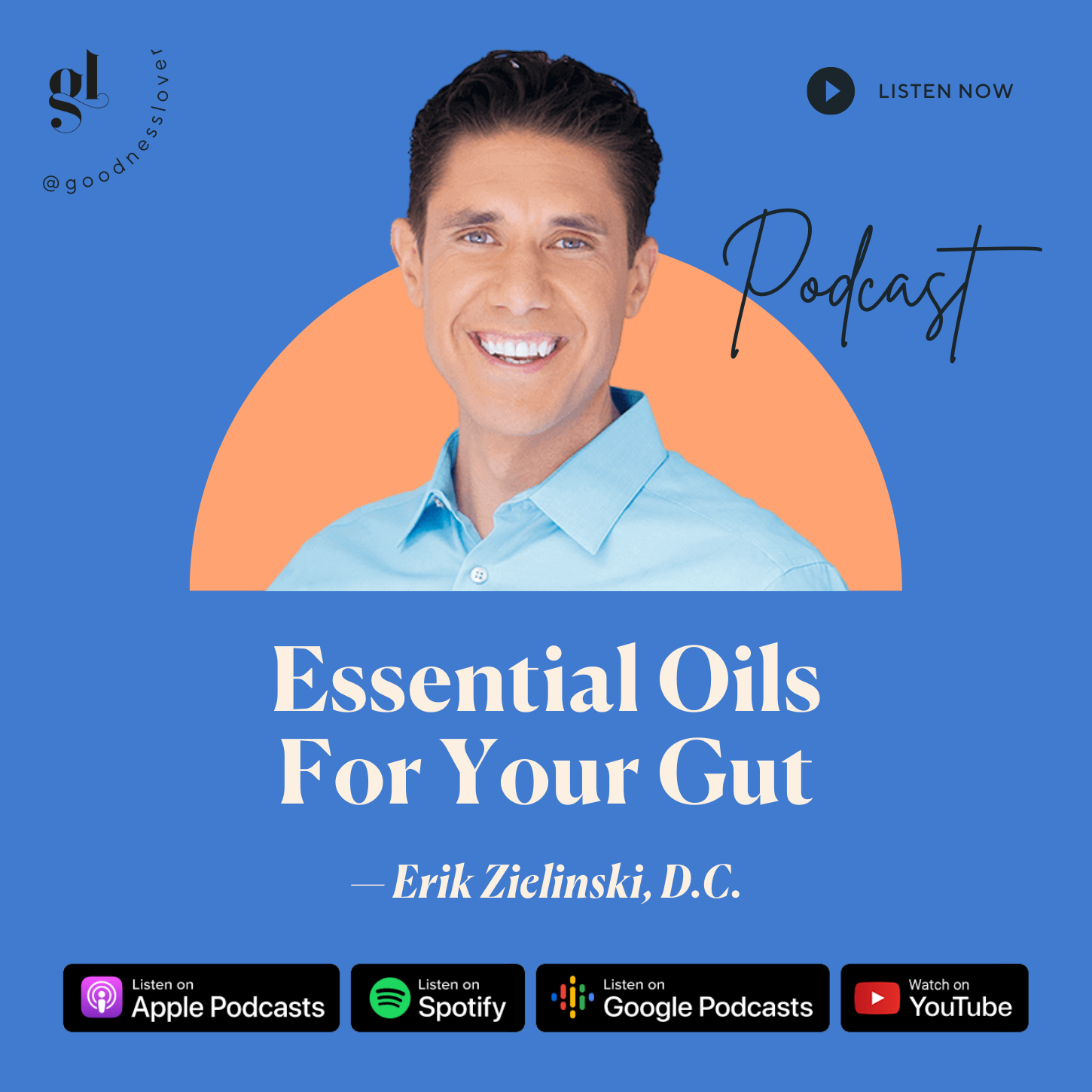




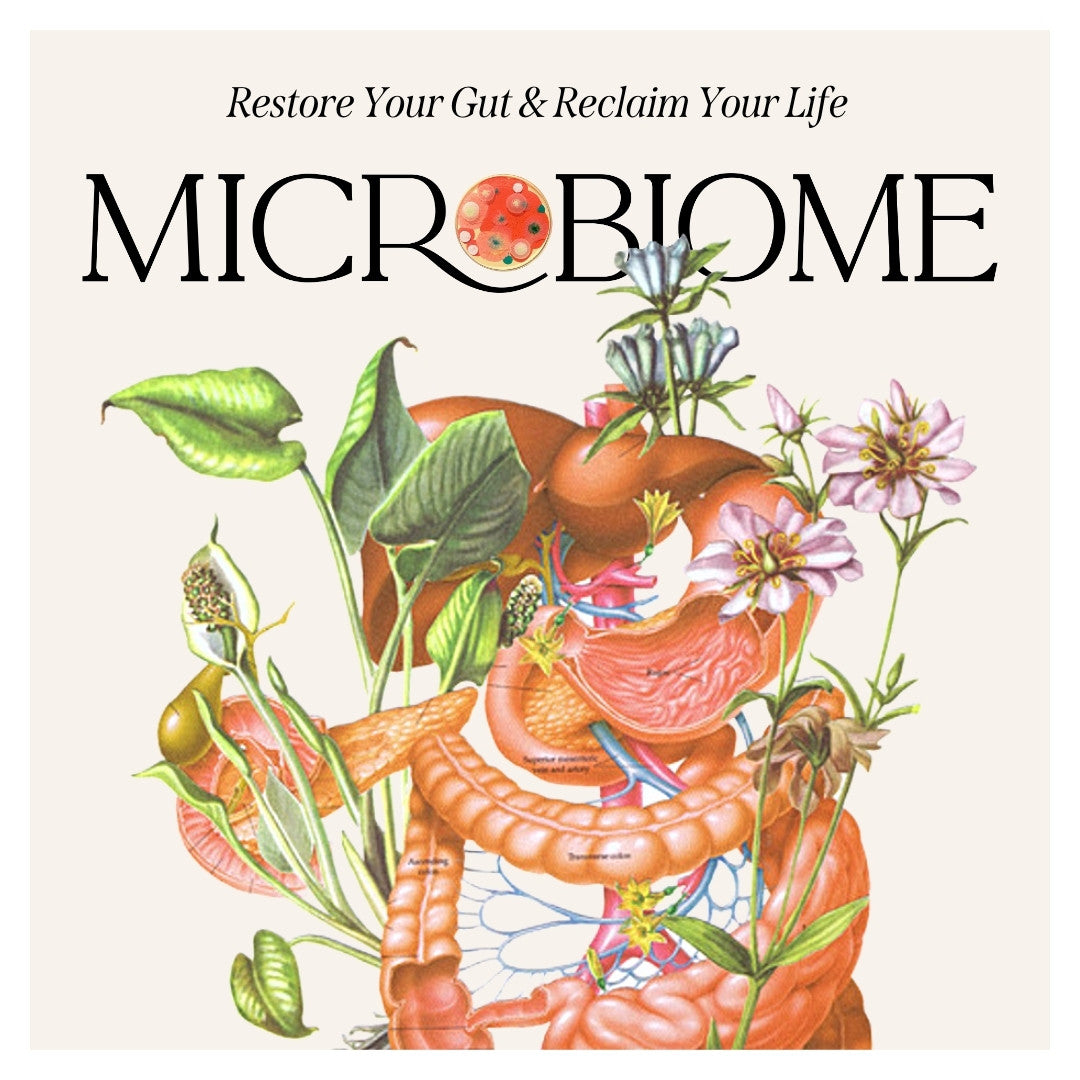
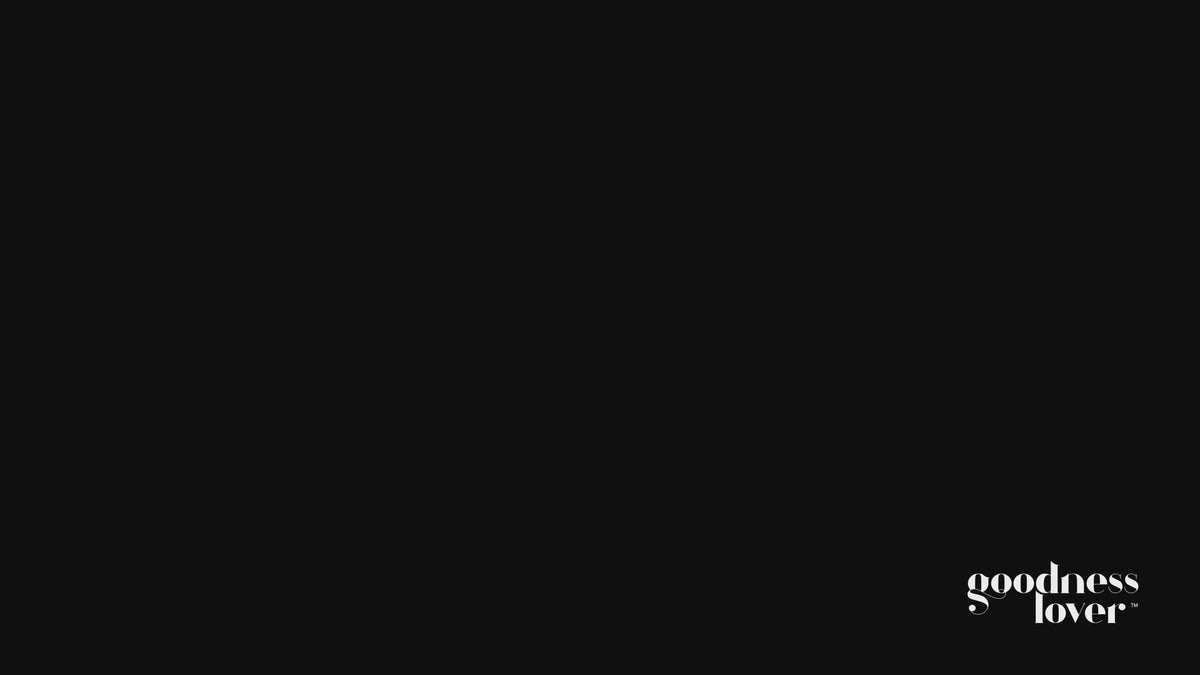
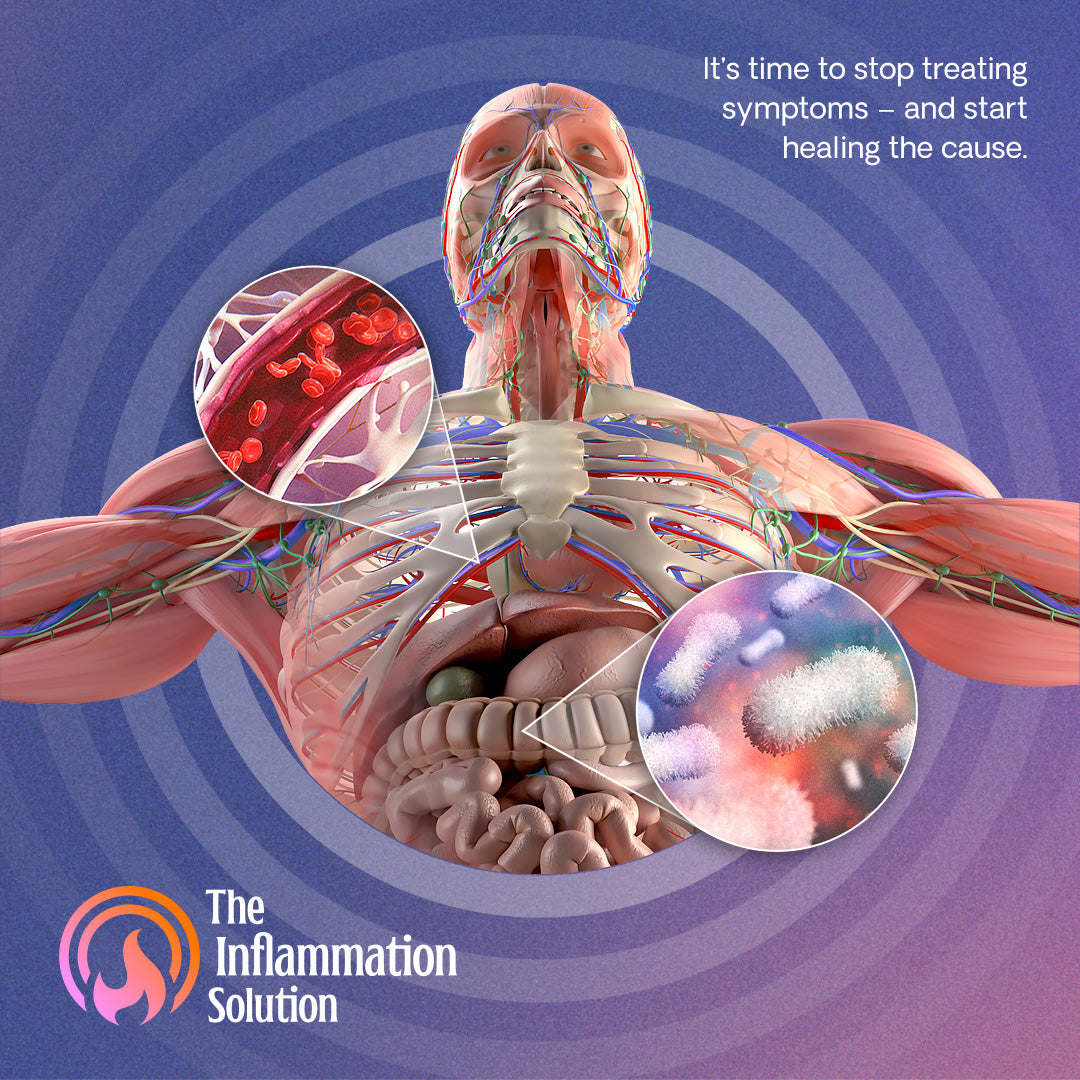
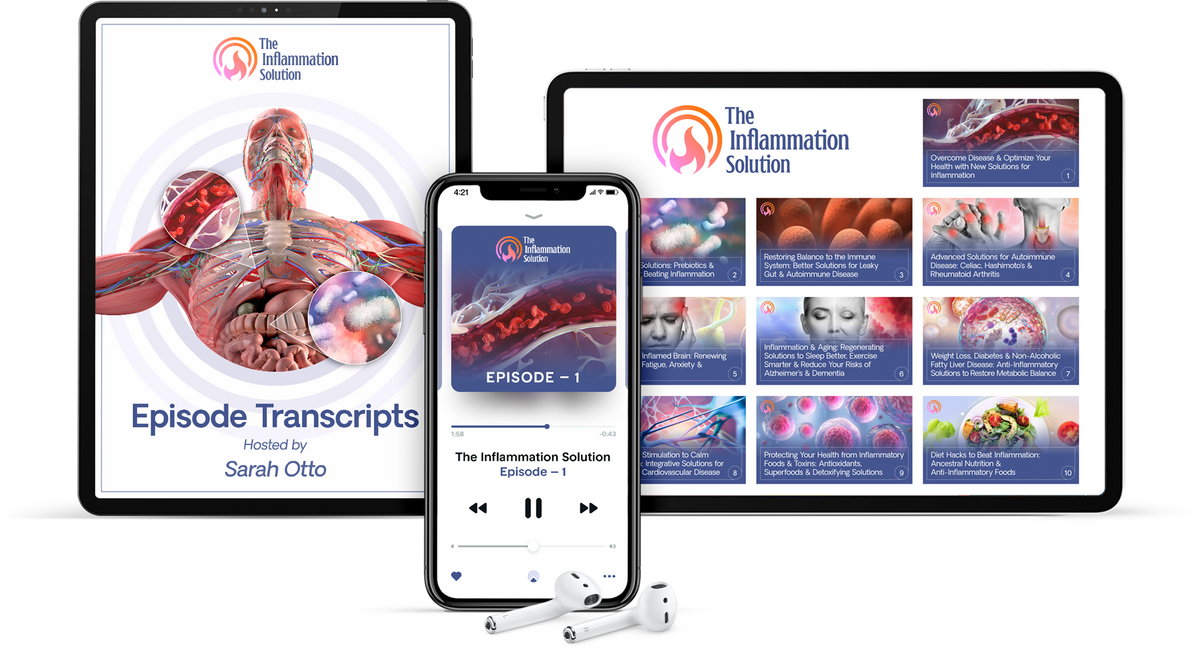
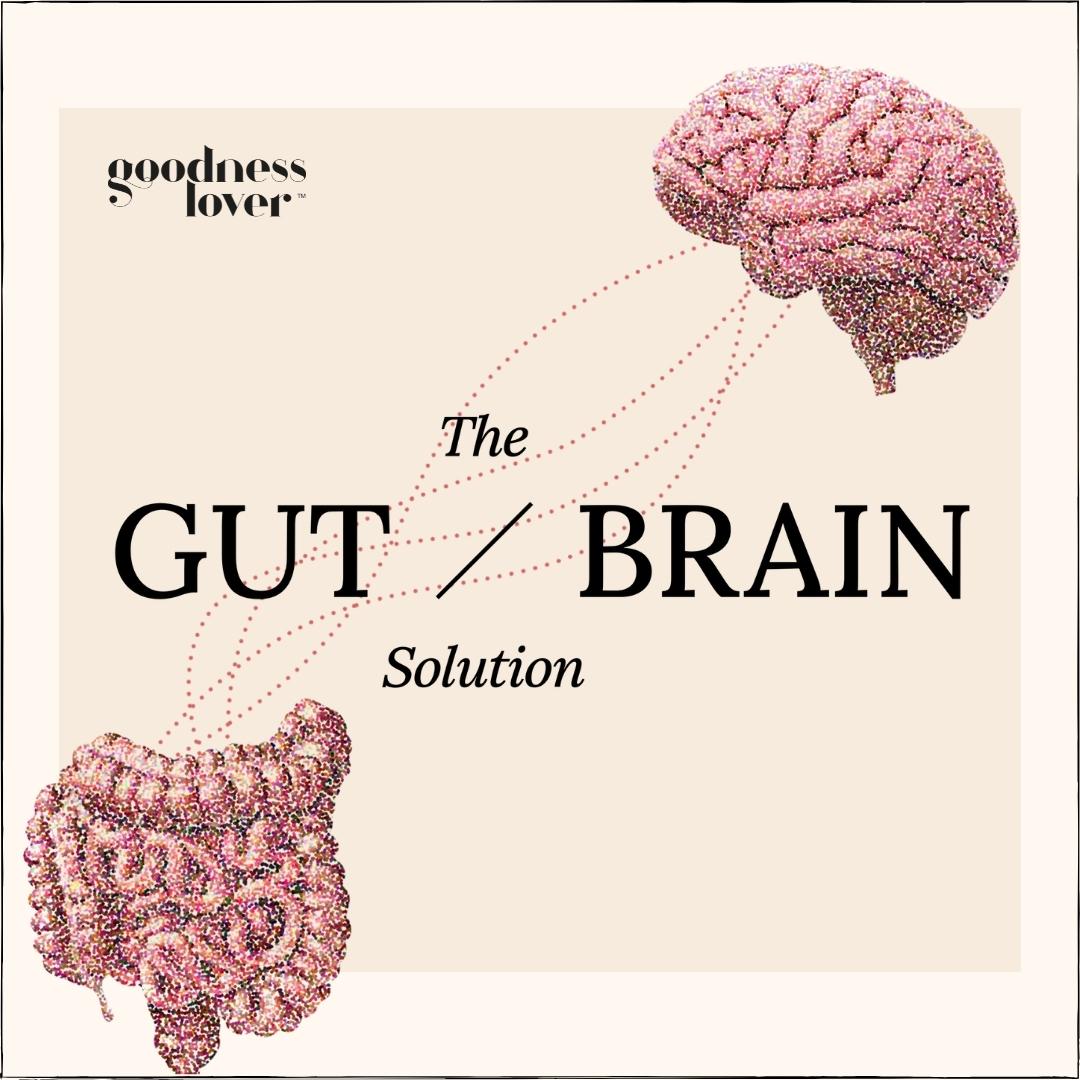

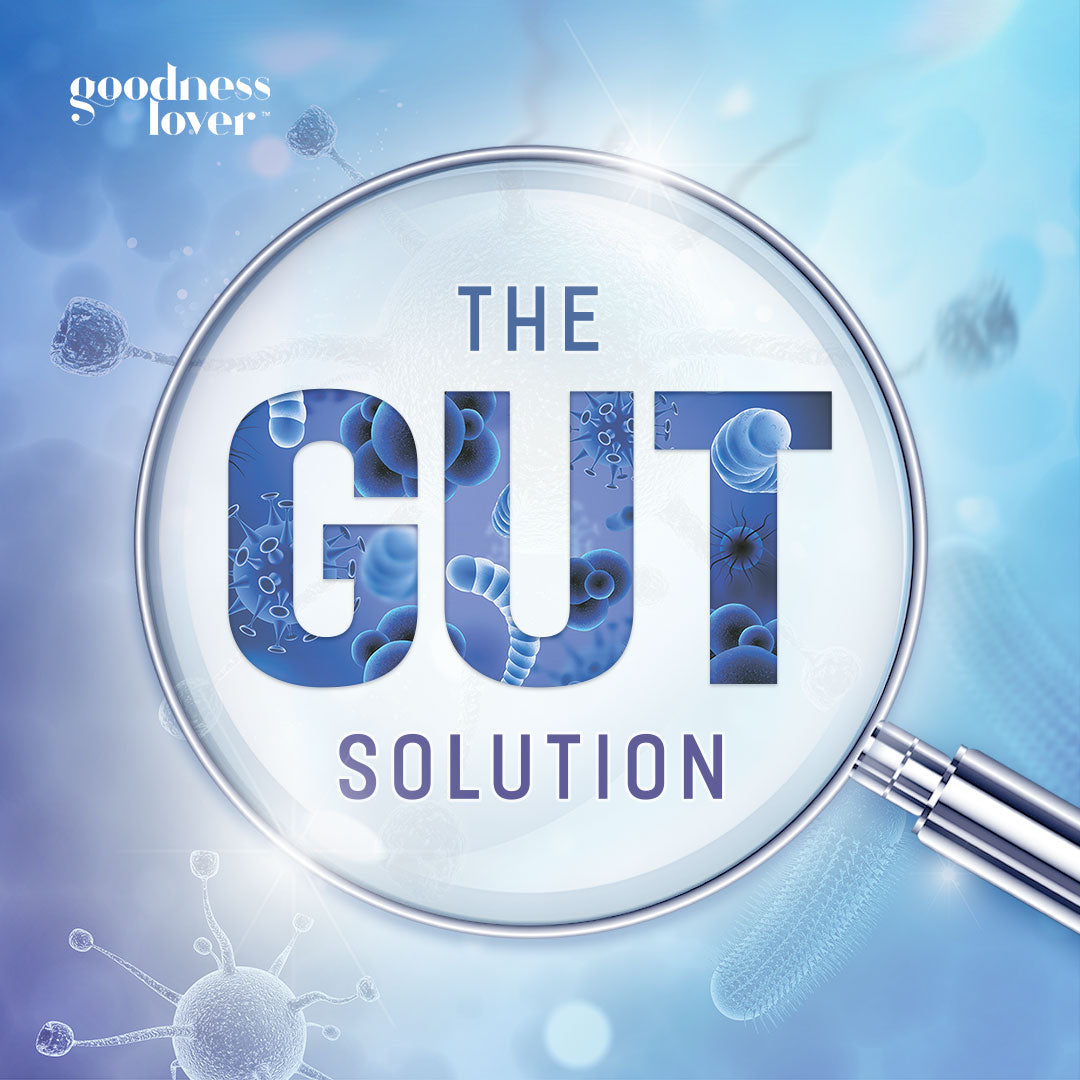
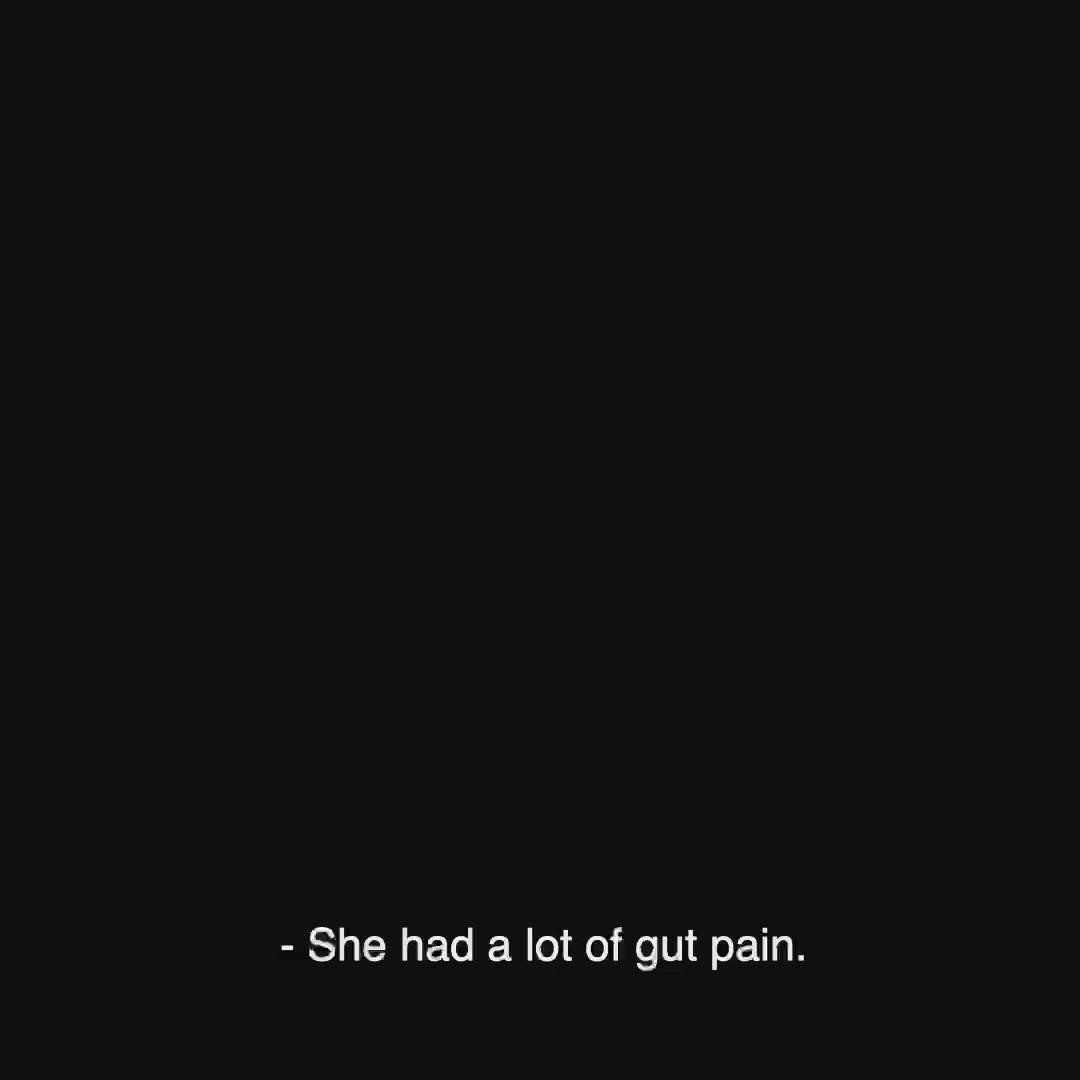
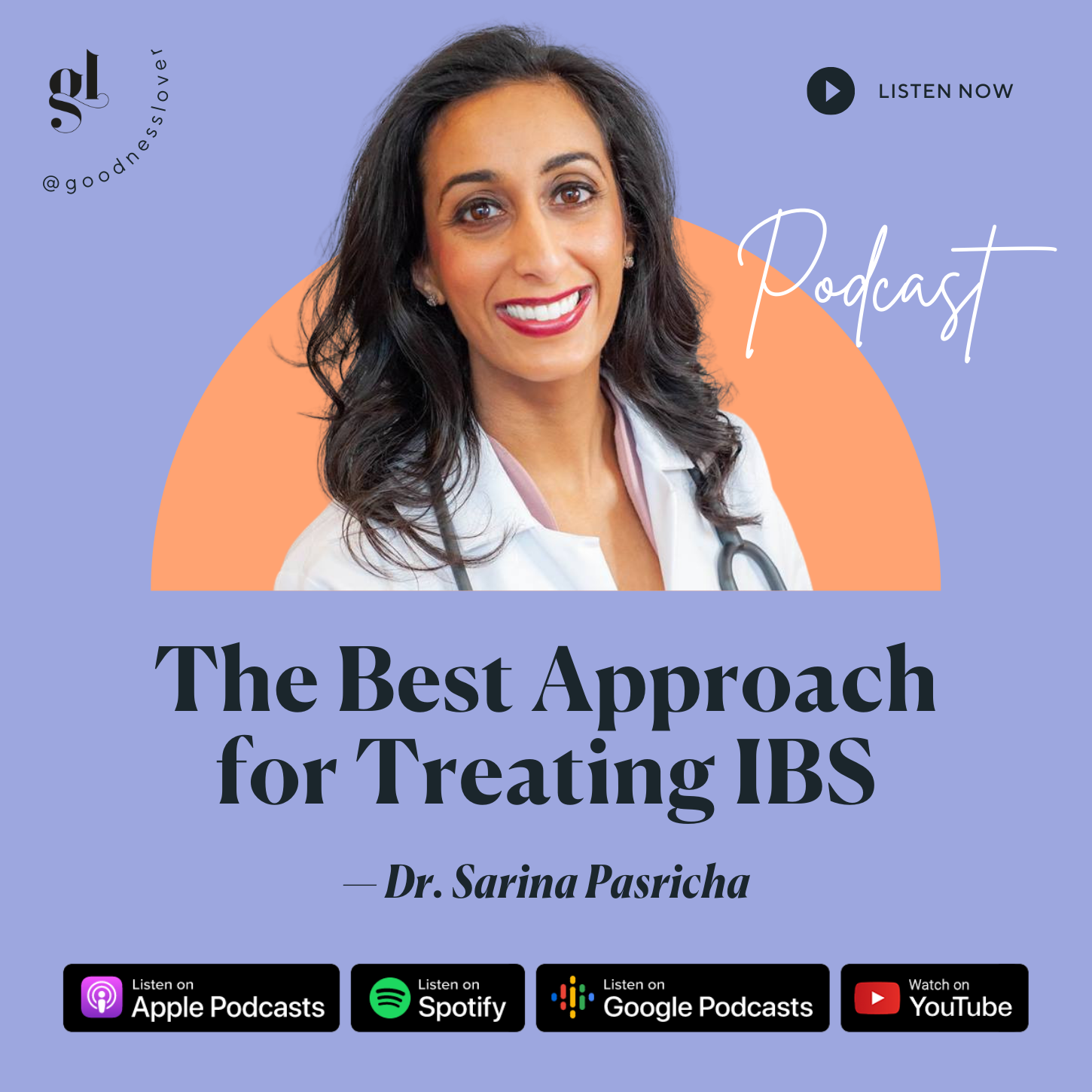
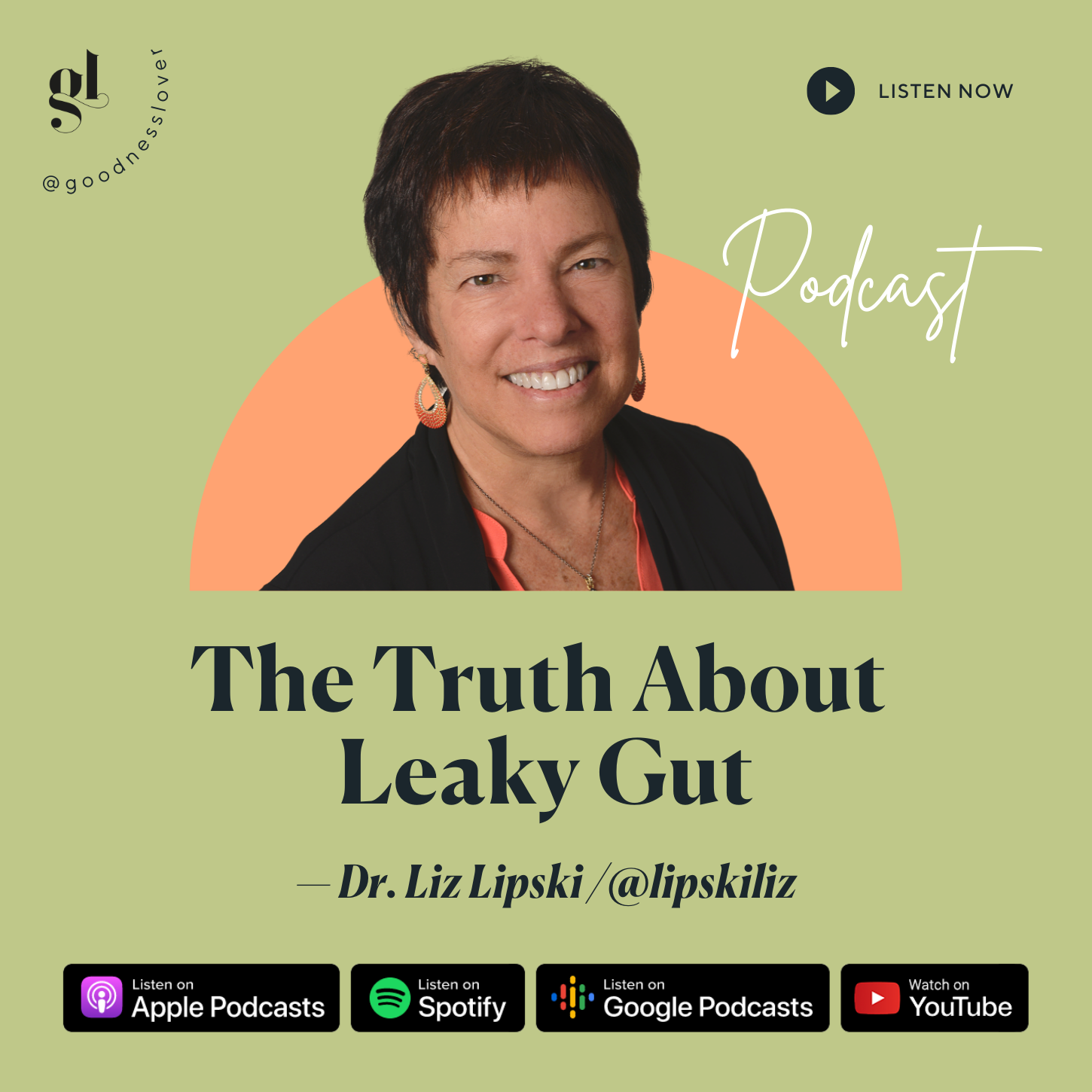

What Do You Think? Comment Below: